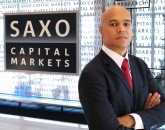There have been many financial companies that have sponsored golf tournaments over the years but there has surely never been one that can rival Charles Schwab in terms of its dedication to the game. The corporation, which is the Official Investment Firm of the PGA Tour in the U.S., has long held the belief that golf and investing share a lot of the same principles, which has led it to support the sport on both a global and local level through platforms as diverse as the Champions Tour’s Charles Schwab Cup and the Hong Kong Golf Association’s annual Rules Seminar. Golf, says James Sun, managing director of Charles Schwab, Hong Kong, Ltd., is at the very heart of the company.
 "Our founder, Chuck Schwab, understood the strength of the connections between investing and golf a long time ago and is passionate about the game,” says Sun, who took up playing seven years ago and has been hooked ever since. “We, as a corporation, have a lasting commitment to golf, one that continues to grow and expand, particularly now in Asia where the sport is becoming more and more popular.”
"Our founder, Chuck Schwab, understood the strength of the connections between investing and golf a long time ago and is passionate about the game,” says Sun, who took up playing seven years ago and has been hooked ever since. “We, as a corporation, have a lasting commitment to golf, one that continues to grow and expand, particularly now in Asia where the sport is becoming more and more popular.”
Sun, who takes to the fairways at both Fanling and Discovery Bay when time allows, cites the emotional control required to be successful in either endeavor.
"Golf and investing both ask you the same question: how good do you want to be? How much of your own time can you devote to getting better but, more importantly, what are your goals and how do you plan to reach them? Controlling your emotions, keeping both greed and fear in check, is key, which is why both disciplines benefit from the perspective of a professional – whether it be a golf coach like Hank Haney or an investment consultant.”
Overconfidence, continues Sun, is a specific example where professional advice can be of particular benefit.
"When a golfer makes a hole-in-one they by and large realise there’s little chance of repeating it at the very next hole. There is skill involved but there’s also a lot of luck. It can be the same with investing,” he says. “If a client makes a 200 per cent gain on a short-term investment, overconfidence can be a danger. They might think they can keep repeating that kind of return. That could be a lack of judgment, and this is where a professional can help.”
Losing sight of the reason why you’re playing golf or investing can be where the connection is most apparent.
"The reason I play golf – my goal in the game, my plan – is to have fun,” says Sun. “I take one hole at a time and I always enjoy myself regardless of my score. In investing, you shouldn’t allow your emotions to get the better of you. You must stick to your plan and stick to the reason why you started investing in the first place.”
Pages
Click here to see the published article.











